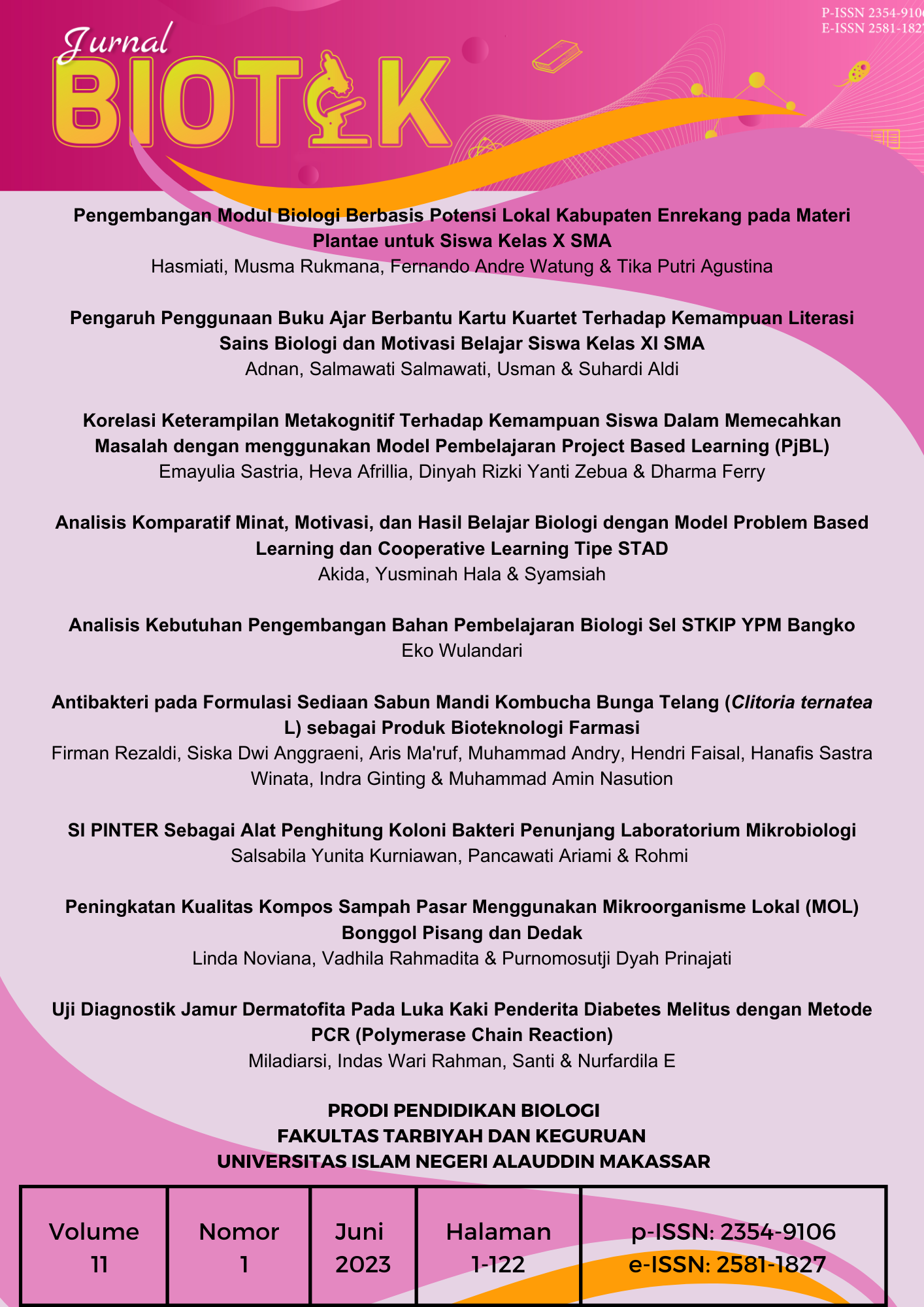Pengembangan Modul Biologi Berbasis Potensi Lokal Kabupaten Enrekang pada Materi Plantae untuk Siswa Kelas X SMA
Abstract
Nature has enormous potential to aid in the study of biology. This potential can be effectively harnessed when presented in teaching materials, such as modules. This research aimed to produce valid learning modules based on the local potential found in Enrekang Regency, which can facilitate contextual and meaningful biology learning. The research method employed was Research and Development (R&D), utilizing the ADDIE development model. Data was collected using an expert validation sheet to assess the module's validity in terms of content, language, presentation, and appearance. The Plantae module, as a product of this development, is based on the local potential and exhibits characteristics such as being self-instructional, self-contained, stand-alone, adaptable, user-friendly, and including pictures of local plants from Enrekang Regency. Based on data analysis, the developed module fulfills the validity criteria in all aspects of the assessment, with an average validity score of 4.1. Consequently, the research concludes that the developed module is valid and can effectively support biology learning by incorporating the local potential of Enrekang Regency.
Downloads
References
Akbar, S. (2016). Instrumen Perangkat Pembelajaran. Bandung: Remaja Rosdakarya.
Ardan, A. S., Ardi, M., Hala, Y., Supu, A., & Dirawan, G. D. (2015). Needs Assessment to Development of Biology Textbook for High School Class X-Based the Local Wisdom of Timor. International Education Studies, 8(4), 52–59.
Chamany, K., Allen, D., & Tanner, K. (2008). Making Biology Learning Relevant to Students: Integrating People, History, and Context into College Biology Teaching. CBE—Life Sciences Education, 7(3), 267–278. doi: 10.1187/cbe.08-06-0029
Çimer, A. (2011). What makes biology learning difficult and effective: Students’ views. Educational Research and Reviews, 7(3), 61–71.
Direktorat Jendral Pengembangan Mutu Pendidikan dan Tenaga Kependidikan. (2008). Penulisan Modul. Jakarta: Depdiknas.
Fatikhah, I., & Izzati, N. (2015). Pengembangan Modul Pembelajaran Matematika Bermuatan Emotion Quotient Pada Pokok Bahasan Himpunan. Eduma: Mathematics Education Learning and Teaching, 4(2), 46–61. doi:10.24235/eduma.v4i2.29
Hala, Y., Saenab, S., & Kasim, S. (2015). Pengembangan Perangkat Pembelajaran Biologi Berbasis Saintifik pada Konsep Ekosistem bagi Siswa Sekolah Menengah Pertama. Journal of Educational Science and Technology (EST), 1(3), 85–96. doi: 10.26858/est.v1i3.1825
Hamalik, O. (2009). Proses Belajar Mengajar. Jakarta: Bumi Aksara.
Hasmiati, Adnan, A., & Hiola, F. (2018). Potensi Keragaman Bryophyta di Kabupaten Enrekang sebagai Sumber Belajar di SMA. Prosiding Seminar Nasional Biologi dan Pembelajarannya, 0, 257–262. Makassar: Pendidikan Biologi Program Pascasarjana UNM. http://ojs.unm.ac.id/semnasbio/article/view/7058
Hasmiati, H., Jamilah, J., & Mustami, M. K. (2017). Aktivitas dan Hasil Belajar Siswa pada Pembelajaran Pertumbuhan dan Perkembangan dengan Metode Praktikum. Jurnal Biotek, 5(1), 21–35. https://doi.org/10.24252/jb.v5i1.3444
Hobri. (2009). Model-model Pembelajaran Inofatif. Jember: Center of Society Studies.
Ibrohim, Afiat, D., Nurdiana, F. R., Estiningsih, Y., & Martiana, C. (2014). Pengembangan Perangkat Pembelajaran IPA Biologi Berbasis Diskoveri-Inkuiri dengan Sumber Belajar Potensi Lingkungan Lokal Kabupaten Pasuruan. Proceeding Biology Education Conference: Biology, Science, Enviromental, and Learning, 11, 1050–1059. Surakarta: Pendidikan Biologi FKIP UNS.
Jang, H., Reeve, J., & Deci, E. L. (2010). Engaging students in learning activities: It is not autonomy support or structure but autonomy support and structure. Journal of Educational Psychology, 102(3), 588–600. doi: 10.1037/a0019682
Lasmiyati, & Harta, I. (2014). Pengembangan Modul Pembelajaran untuk Meningkatkan Pemahaman Konsep dan Minat SMP. Pythagoras: Jurnal Pendidikan Matematika, 9(2), 161–174.
Mulyasa, E. (2013). Konsep, Karakteristik, Implementasi, dan Inovasi Kurikulum Berbasis Kompetensi. Bandung: PT. Remaja Rosdakarya.
Mumpuni, K. E., Susilo, H., & Rochman, F. (2014). Potensi Tumbuhan Lokal Sebagai Sumber Belajar Biologi. Proceeding Biology Education Conference: Biology, Science, Enviromental, and Learning, 11, 825–829. Surakarta: Pendidikan Biologi FKIP UNS.
Riduwan. (2010). Metode & Teknis Menyusun Tesis. Bandung: Alfabeta.
Sarah, S., & Maryono. (2014). Keefektifan Pembelajaran Berbasis Potensi Lokal dalam Pembelajaran Fisika SMA dalam Meningkatkan Living Values Siswa. Jurnal Pendidikan Sains, 2(1), 36–42. http://jurnal.unimus.ac.id/index.php/JPKIMIA/article/view/1382
Sawitri, D. W., Wisanti, & Ambarwati, R. (2014). Pengembangan Modul Keanekaragaman Hayati Berbasis Pendekatan Saintifik untuk Siswa Kelas X SMA. Jurnal Bioedu, 3(3), 410–415.
Silaturahmi. (2017). Pengembangan Perangkat Pembelajaran Biologi Berbasis Model Pembelajaran Inkuiri Terbimbing pada Materi Sistem Pencernaan Makanan bagi Siswa SMA (Tesis). Universitas Negeri Makassar.
Sitepu. (2014). Pengembangan Sumber Belajar. Jakarta: Rajawali Press.
Widowati, A. (2012). Optimalisasi Potensi Lokal Sekolah dalam Pembelajaran Biologi Berbasis Kontruktivisme. Majalah Ilmiah Pembelajaran, 8(2).
Zulfadli. (2017). Pengembangan Modul Biologi pada Materi Ekosistem Berbasis Problem Based Learning untuk siswa Kelas X SMA Muhammadiyah Kota Tarakan. Jurnal Bionature, 17(1), 63–67.
Copyright (c) 2023 Hasmiati, Musma Rukmana, Fernando Andre Watung, Tika Putri Agustina

This work is licensed under a Creative Commons Attribution-ShareAlike 4.0 International License.
Authors who publish with Jurnal Biotek agree to the following terms: Authors retain the copyright and grant Universitas Islam Negeri Alauddin Makassar right of first publication with the work simultaneously licensed under a Creative Commons Attribution License (CC BY-SA 4.0) that allows others to share (copy and redistribute the material in any medium or format) and adapt (remix, transform, and build upon the material) the work for any purpose, even commercially with an acknowledgement of the work's authorship and initial publication in Universitas Islam Negeri Alauddin Makassar. Authors are able to enter into separate, additional contractual arrangements for the non-exclusive distribution of the journal's published version of the work (e.g., post it to an institutional repository or publish it in a book), with an acknowledgement of its initial publication in Universitas Islam Negeri Alauddin Makassar. Authors are permitted and encouraged to post their work online (e.g., in institutional repositories or on their website) prior to and during the submission process, as it can lead to productive exchanges, as well as earlier and greater citation of published work (See The Effect of Open Access).

This work is licensed under a Creative Commons Attribution-ShareAlike 4.0 International License.



